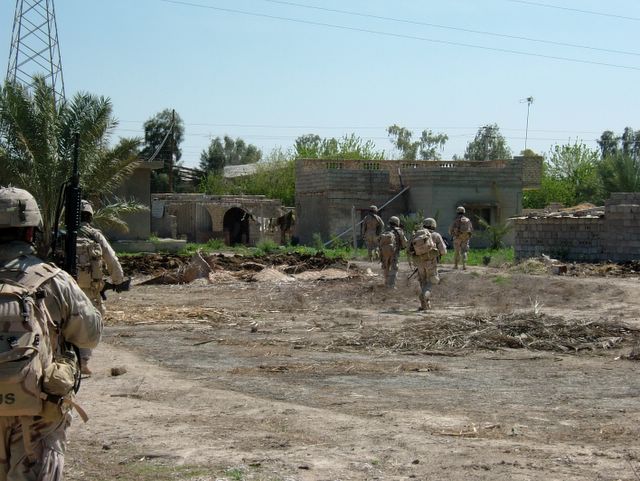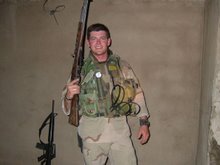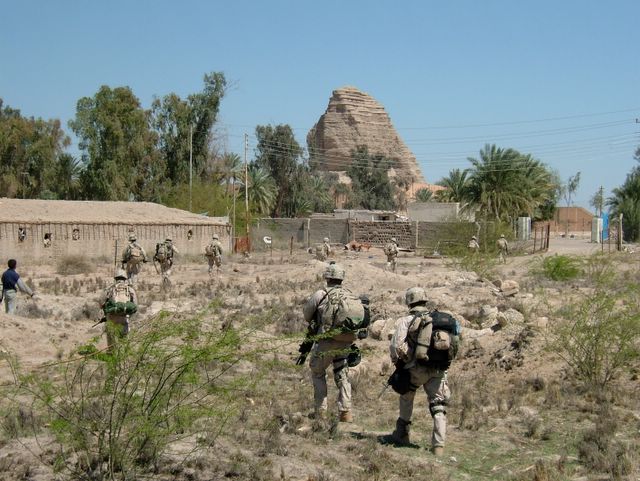Not that what's happening with Israel and Lebanon isn't important, but, America is still fighting a War
2 Americans, dozens of Iraqis killed
By ROBERT H. REID
Associated Press Writer
Two American soldiers were killed Saturday in Baghdad, seven Shiite construction workers were gunned down and five Sunni civilians were blown up, deepening the capital's security crisis. Shiite politicians called on the prime minister to cancel his visit to Washington to protest Israel's attacks in Lebanon.
Elsewhere, U.S. and Iraqi forces backed by a helicopter gunship launched a major attack Saturday on a headquarters of a radical Shiite militia south of Baghdad, killing 15 militiamen in a three-hour battle, the U.S. said.
One U.S. soldier died in the second of two roadside bombs that exploded in east Baghdad at mid-morning. An Iraqi civilian was killed by the first blast, police said. Another American soldier died Saturday evening when gunmen attacked his patrol with small arms fire, the military said.
The seven Shiite workers were killed and two were wounded when gunmen opened fire on a construction site near Baghdad International Airport, police said. Later Saturday, a mortar shell killed five civilians at a market in the mostly Sunni neighborhood of Amil in west Baghdad, police said.
Two rockets also blasted the heavily guarded Green Zone, which includes the U.S. and British embassies as well as major Iraqi government offices, but the U.S. military said there were no casualties.
Much of the violence appeared to be part of the tit-for-tat reprisal killings by Sunni and Shiite extremists which have led to a dramatic deterioration of security in the Iraqi capital.
With violence rising, the United States is moving to bolster American troop strength in the Baghdad area, putting on hold plans to draw down on the 127,000-member U.S. military mission in Iraq.
U.S. officials have pointed to Shiite militias as a major cause of sectarian violence. In a bid to curb militia influence, American troops moved Saturday against the Mahdi Army of radical cleric Muqtada al-Sadr in Musayyib, 40 miles south of Baghdad.
U.S. troops reported killing 15 gunmen in a three-hour firefight in Musayyib but described them only as "thugs and criminals" who had tried to take over the city. Sheik Jalil al-Nouri, an aide to al-Sadr, said U.S. and Iraqi forces attacked the Mahdi Army office in Mussayib and that sporadic shooting was still underway late Saturday.
Local officials said the Americans conducted a similar raid on al-Sadr's office in Mahmoudiya, about 20 miles south of Baghdad and scene of an attack five days ago in which 50 people were killed.
In London, the British military announced Saturday that British troops arrested the Mahdi Army commander in Basra in raids last weekend against militia weapons depots.
With violence rising, the United States is moving to bolster American troop strength in the Baghdad area, putting on hold plans to draw down on the 127,000-member U.S. military mission in Iraq.
The security crisis in Baghdad is expected to figure prominently when Prime Minister Nouri al-Maliki meets President George W. Bush at the White House on Tuesday. U.S. officials are expected to push al-Maliki, a Shiite, to move quickly to calm sectarian tensions and abolish Shiite militias blamed for much of the violence.
But the visit comes amid rising anger among Iraqis over Israel's attacks in Lebanon, launched after Shiite Hezbollah militiamen seized two Israeli soldiers.
On Saturday, the Fadhila party, which is part of al-Maliki's Shiite alliance, urged the prime minister to call off his visit.
"Fadhila demands that the prime minister cancel his visit to the U.S. in solidarity with the Lebanese people and over what is going on there, the disasters due to the Zionist aggression amid international silence about these crimes," party official Sheik Sabah al-Saiedi told The Associated Press.
Despite public anger over Lebanon, the Shiite political establishment has too much to lose politically by risking its ties with the Americans over the fate of Hezbollah.
Nevertheless, al-Maliki, a former Shiite activist who spent years in exile in Syria, has condemned Israel's offensive and has complained that the United States and the international community have not done enough to stop it.
Al-Maliki told reporters he would convey that message personally to Bush.
"The hostile acts against Lebanon will have effects on the region and we are not far from what is going on in Lebanon," al-Maliki said. "We will speak with the United Nations and American government to call for a cease-fire quickly."
Al-Maliki spoke following the first meeting of a government committee formed to reconcile Iraq's disparate sectarian and political groups, but differences emerged immediately between top Shiite and Sunni officials over the issue of amnesty for insurgents.
Al-Maliki told reporters that despite his proposal for amnesty for some insurgents, "all those whose hands were tainted with blood should be brought to justice."
But the Sunni speaker of parliament, Mahmoud al-Mashhadani, snapped back, saying that "if we punish a person who killed an American soldier, who is an occupier, we should punish the American soldiers who killed an Iraqi who fought against occupation."
Most of the insurgents who have been fighting U.S. forces are Sunnis. The United States and the Iraqi government have sought to reach out to selected insurgent groups in hopes of convincing them to lay down their arms.
In other news Saturday:
• 10 Iraqi soldiers were killed when a roadside bomb struck a convoy in Karmah, west of Fallujah in the insurgent stronghold of Anbar province, police Lt. Ahmed Ali said.
• Three people died and five were injured in a bombing and shooting in the market in Baqouba, where U.S. forces killed five civilians the day before. The U.S. military expressed regret over the civilian deaths and blamed extremists for putting civilians in danger.
• An American soldier died Thursday of a non-combat related injury, the U.S. military reported. He was assigned to the 43rd Military Police Brigade.
• One civilian was killed when masked gunmen attacked Iraqi police in Mosul, and three gunmen died in an a separate firefight with police there.
__
Eds: Associated Press correspondents Bassem Mroue, Qassim Abdul-Zahra, Qais al-Bashir and Ryan Lenz contributed to this report in Baghdad.
Copyright © 2006 The Associated Press. All rights reserved. The information contained in the AP News report may not be published, broadcast, rewritten or redistributed without the prior written authority of The Associated Press.












